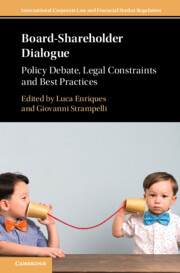Book contents
- Board-Shareholder Dialogue
- International Corporate Law and Financial Market Regulation
- Board-Shareholder Dialogue
- Copyright page
- Contents
- Contributors
- Foreword
- The Dialogue between Corporations and Institutional Investors
- 1 The New Corporate Governance
- 2 Shareholder Voice and Corporate Purpose
- 3 The Purpose of Corporate Purpose Statements
- 4 Systemic Stewardship with Tradeoffs
- 5 Giant Asset Managers, the Big Three, and Index Investing
- 6 Something Old, Something New
- 7 The Perils and Promise of Shareholders as Stakeholder Advocates
- 8 How to Facilitate ESG Investor Engagement
- 9 Emerging ESG-Driven Models of Shareholder Collaborative Engagement
- 10 ESG and Board-Shareholder Engagement in M&A
- 11 How Does Board-Shareholder Engagement Really Work?
- 12 Shareholder Engagement inside and outside the Shareholder Meeting
- 13 The Viability of Blockchain in Corporate Governance
- 14 Shareholder Engagement in East Asia
- 15 Board-Shareholder Engagement and Directors’ Appointments
- 16 Shareholder Proposals and the Debate over Sustainability Disclosure
- 17 Board-Shareholder Engagement and Disclosure Obligations under Corporate Governance Codes
- 18 Board-Shareholder Engagement and Insider Regulation
- 19 Market Soundings Rules
15 - Board-Shareholder Engagement and Directors’ Appointments
Published online by Cambridge University Press: 31 August 2024
- Board-Shareholder Dialogue
- International Corporate Law and Financial Market Regulation
- Board-Shareholder Dialogue
- Copyright page
- Contents
- Contributors
- Foreword
- The Dialogue between Corporations and Institutional Investors
- 1 The New Corporate Governance
- 2 Shareholder Voice and Corporate Purpose
- 3 The Purpose of Corporate Purpose Statements
- 4 Systemic Stewardship with Tradeoffs
- 5 Giant Asset Managers, the Big Three, and Index Investing
- 6 Something Old, Something New
- 7 The Perils and Promise of Shareholders as Stakeholder Advocates
- 8 How to Facilitate ESG Investor Engagement
- 9 Emerging ESG-Driven Models of Shareholder Collaborative Engagement
- 10 ESG and Board-Shareholder Engagement in M&A
- 11 How Does Board-Shareholder Engagement Really Work?
- 12 Shareholder Engagement inside and outside the Shareholder Meeting
- 13 The Viability of Blockchain in Corporate Governance
- 14 Shareholder Engagement in East Asia
- 15 Board-Shareholder Engagement and Directors’ Appointments
- 16 Shareholder Proposals and the Debate over Sustainability Disclosure
- 17 Board-Shareholder Engagement and Disclosure Obligations under Corporate Governance Codes
- 18 Board-Shareholder Engagement and Insider Regulation
- 19 Market Soundings Rules
Summary
The right to elect and remove directors is a key feature of shareholder participation in corporate governance. Indeed, the ultimate form of board-shareholder engagement is for shareholders to have their representatives inside the boardroom. This chapter examines the role that minority shareholders play in nominating directors to corporate boards. Despite the growth in power of institutional investors, and their increasing commitment to investor stewardship, global asset managers almost never attempt to nominate director candidates themselves. Rather, the most effective instigators of minority shareholder board representation are activist hedge funds. This chapter makes three key contributions to the discussion on board-shareholder engagement. First, drawing on a hand-collected dataset of activist board representation campaigns at S&P 500 companies, it analyses the practice of activist hedge funds appointing directors to corporate boards. Second, it explores the implications these cases of activist-nominated directors may have on accepted wisdom regarding the role of the board. In particular, it is argued that activist‑appointed directors may expose some of the limitations of the current independent monitoring board model and exemplify a solution where boards proactively contribute to sustainable value creation. Third, the chapter explores how to facilitate broader institutional investor participation in the director appointment process.
Keywords
Information
- Type
- Chapter
- Information
- Board-Shareholder DialoguePolicy Debate, Legal Constraints and Best Practices, pp. 450 - 474Publisher: Cambridge University PressPrint publication year: 2024
